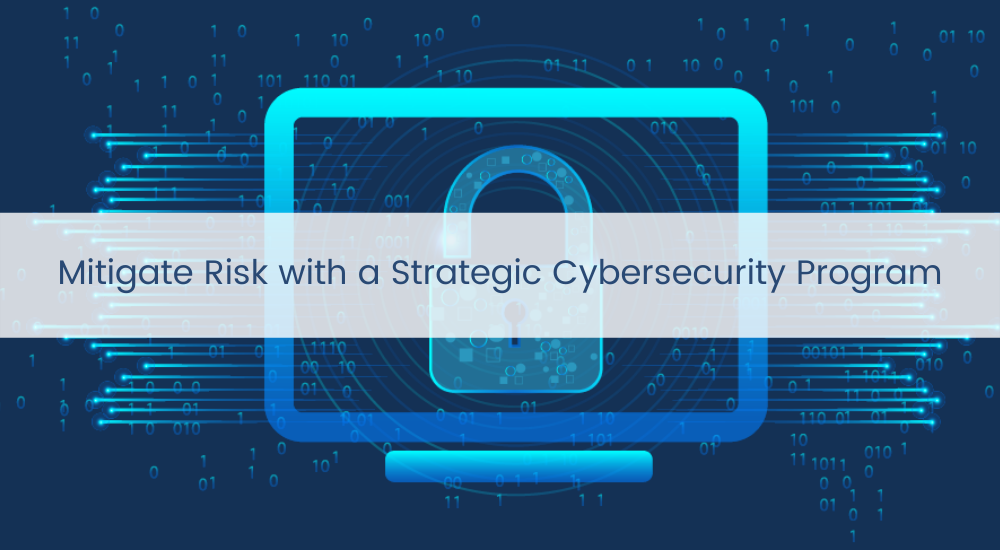
October is Cybersecurity Awareness Month. Is your cybersecurity program robust enough to take on the outside world?
It’s easy to feel confident that your DIY cybersecurity program is protecting your organization’s digital assets because you bought the very best tools. But it’s always a good idea to have a third party review your security protocols. With a cybersecurity review as simple as a Penetration Test, or as comprehensive as a Security Posture Assessment, you can learn about your environment and understand your risk. A Security Posture Assessment can identify critical gaps in your protection strategy and offer remediation strategies to shore up your defenses.
Comprehensive cybersecurity protection requires more than tools, it requires the discipline, expertise, and processes to deploy a security strategy across the entire organization. Building a cybersecurity strategy starts by taking a close look at your in-house IT capabilities. How are you currently managing daily IT tasks? Are you framing your infrastructure, maintaining an available network, tracking assets, and developing meaningful metrics to understand success?
Hear what Dieter Gable, CEO of TBConsulting (TBC), has to say about the importance of deploying a comprehensive cybersecurity strategy across your IT infrastructure.
Prepare to invest a significant amount of time and financial resources to stand up, operate, and optimize your cybersecurity protections. Many organizations seek to outsource the burden of a 24/7/365 security operations center to a trusted Managed Service Provider (MSP) for greater efficiency and cost savings. Security teams at an MSP have the depth of knowledge and training to provide top-tier alert monitoring service and can recommend, and implement, any remediations necessary to keep your business running.
Whether you plan to keep things in-house or engage an MSP to develop and maintain your cybersecurity program, make sure to incorporate these three critical components into your security strategy.
1) Focus on meaningful metrics
Up to 83% of in-house IT teams feel “alert fatigue” and may override a critical alert in processing the deluge of false-positives coming in. The time and effort devoted to investigating false positives hurts your bottom line and exhausts your security team.
Analyze your alert data to identify patterns so you know which ones you may safely ignore, and which ones require actionable responses. Develop metrics that are meaningful to your business and make changes that will positively impact the filtering of intelligence.
2) Integrate cybersecurity into every IT component and resource
Cybersecurity is not just an IT problem. Cybersecurity is a business problem. Consider data your most valuable asset and be willing and able to protect it at every stage – while in use, in transmission, and in storage.
Implement cybersecurity training programs to educate all levels of employees in the organization and use the training as a foundation to create a culture of cybersecurity awareness. Encourage questions and healthy skepticism from everyone; thus, when your team sees something “phishy,” they’ll be comfortable reaching out to your security team for support. Understand that each and every person plays an important role in keeping your data safe and maintaining business productivity.
3) Drive efficiency and innovation
While each organization’s security needs are different, the stages of preparing a cyber defense program are the same. The initial step is discovery to investigate all users, data, networks, applications and devices that are accessing your environment. Next, build a customized strategy that will outline processes to onboard additional assets, protect them, and detect any abnormalities. Your strategy should also include expectations around incident response and recovery.
Without a strategy, your security program is fragmented, and provides no real security at all. You may need help in building a robust cybersecurity strategy that can accommodate growth, meet the demands of your business, and support your risk profile. An MSP can help you create a scheduled cadence of patching, maintenance, and backups to drive efficiency, improve functionality, and eliminate unplanned outages.
TBConsulting is an MSP with 25 years of experience in the IT space. TBC has helped partners build and implement comprehensive cybersecurity programs to protect their business continuity and maintain productivity. Cybersecurity is serious work, and our security teams are constantly upskilling and mastering new certifications to stay ahead of the curve. Our industry-leading tools and integration protocols support our security architects and engineers to enhance response times through our 24/7/365 security operations center. Contact TBC today to give your assets the protection they deserve.
.png)


